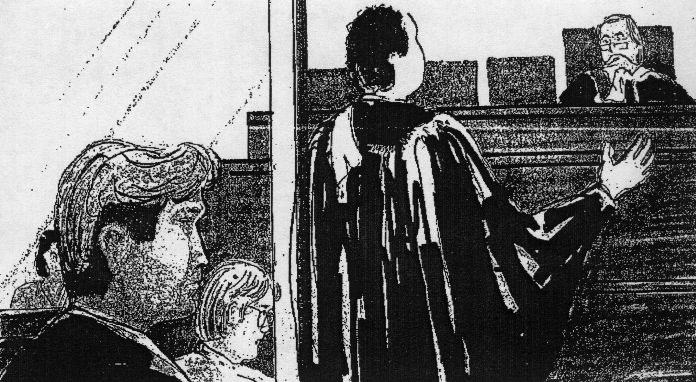

The 'victims' in black robes:
Lending weight to psychobabble won't give us what we need: judges with strong hearts and sound
judgment.
August 20, 2002
For
years, we've been hearing how crime victims are revictimized by our judicial process. Now, it
seems, we need to start worrying about the judges, too. "Judges live in torment," blazed
a headline last week in one of Canada's national newspapers. According to Washington psychologist
and marital therapist Isaiah Zimmerman, who addressed the recent annual meeting of the Canadian
Superior Court Judges Association in London, Ont., their job can turn judges into trauma victims
-- unable to talk to their colleagues, control their emotions or, in some cases, even carry out
their tasks. Citing wrenching trial evidence, swollen dockets and public criticism as some of
the causes of this vocational trauma, Mr. Zimmerman reported that in surveying Canadian judges,
some had whispered "some very painful things." One judge reportedly confided that "during
a particularly long and vexing trial, at the end of the day (he) would retire to chambers, sit
for a while, sometimes cry." Others pointed out that it was "no fun to be disliked in
a small community" where they lived and some feared "becoming indifferent to horror."

Ontario Superior Court Chief Justice Patrick LeSage, who oversaw the Paul Bernardo trial in 1995, admitted that he has never got over seeing the videotaped torture of the young murder victims, Kristen French and Leslie Mahaffy.
Such an admission of emotional reactions shouldn't come as a surprise to any of us. Most people, I think, would be inclined to expect that a man of Judge LeSage's moral stature would experience profound sadness when faced with images and memories of such brutality. The problem is that, in our self-absorbed culture of trauma and treatment, we've come to believe that such feelings and tears are manifestations of a psychological problem, in this case "judicial stress."
Sometimes employed to explain erratic behaviour and inappropriate comments of misbehaving judges, this term is more often invoked when describing entirely understandable human reactions. Giving them this psychological label serves to lure us into accepting the notion that there's something different -- even pathological -- going on.
Since its introduction in the 1980s, the term "judicial stress" has inspired a rash of articles by those now seen as "the experts" on the topic. These are the shrinks who now lecture judges about their high levels of stress, offering suggestions about how to manage it. What we tend not to notice is that, if stripped of psychological jargon, we'd recognize these suggestions as familiar apple-pie nostrums -- mundane notions such as talking about your feelings, getting enough sleep, exercising, taking vitamins and remembering to eat -- that our mothers might have suggested in days gone by.
Judges do have my sympathy. Too often their schedules are overloaded. They deal with messy situations, face gruesome stuff and make tough decisions. Wrongful convictions, victim rights and a mass of social
issues undermine their authority, diminishing the power they once had. Sure, it's not an easy job and, these days, they're having a particularly rough time of it.
But to suggest that they suffer from judicial stress is to cast them as victims. And what that will ultimately do is further diminish their public image, raising even more doubts about their ability to render judicious and rational judgments.
For years, judges have been getting trained to be more sensitive. A decade ago, the pressure was on to make it mandatory for them to take sensitivity training so they would learn about the emotional fragility of victims and their families. Some of us think that was a bad idea, that it shifted their focus away from "facts" and too far into "feelings." What I'm wondering is whether we can afford to take them even further, sucking them into claiming their own victimized status, training them to be sensitive to their own emotions. What will happen to our justice system if our judges become as self-absorbed as everyone else?
Last week, when the chief justice of the Supreme Court of Canada, Beverley McLachlin, asked if there was any way chief justices can help their judges, Mr. Zimmerman advised her to assume the role of "a good parent."
I hope when she weighs that suggestion she'll do so with a healthy amount of judicial skepticism. The last thing we need is for her to become our great mother. I suspect that what would benefit not only her judges but all of Canadian society most would be for her to demonstrate the strong heart and clear mind of a good judge.
Back in 1998, then-Supreme Court chief justice Antonio Lamer pointed out that "the judicial system is very, very fragile." He cautioned: "Watch it, criticize it, control it properly, yes, but judge-bashing must stop."
Now, amidst the psychobabble about stressed-out judges, it's time to clue in to the possibility that judge-shrinking could be doing even more harm to Canada's judicial system than judge-bashing.

Ontario Superior Court Chief Justice Patrick LeSage, who oversaw the Paul Bernardo trial in 1995, admitted that he has never got over seeing the videotaped torture of the young murder victims, Kristen French and Leslie Mahaffy.
Such an admission of emotional reactions shouldn't come as a surprise to any of us. Most people, I think, would be inclined to expect that a man of Judge LeSage's moral stature would experience profound sadness when faced with images and memories of such brutality. The problem is that, in our self-absorbed culture of trauma and treatment, we've come to believe that such feelings and tears are manifestations of a psychological problem, in this case "judicial stress."
Sometimes employed to explain erratic behaviour and inappropriate comments of misbehaving judges, this term is more often invoked when describing entirely understandable human reactions. Giving them this psychological label serves to lure us into accepting the notion that there's something different -- even pathological -- going on.
Since its introduction in the 1980s, the term "judicial stress" has inspired a rash of articles by those now seen as "the experts" on the topic. These are the shrinks who now lecture judges about their high levels of stress, offering suggestions about how to manage it. What we tend not to notice is that, if stripped of psychological jargon, we'd recognize these suggestions as familiar apple-pie nostrums -- mundane notions such as talking about your feelings, getting enough sleep, exercising, taking vitamins and remembering to eat -- that our mothers might have suggested in days gone by.
Judges do have my sympathy. Too often their schedules are overloaded. They deal with messy situations, face gruesome stuff and make tough decisions. Wrongful convictions, victim rights and a mass of social
issues undermine their authority, diminishing the power they once had. Sure, it's not an easy job and, these days, they're having a particularly rough time of it.
But to suggest that they suffer from judicial stress is to cast them as victims. And what that will ultimately do is further diminish their public image, raising even more doubts about their ability to render judicious and rational judgments.
For years, judges have been getting trained to be more sensitive. A decade ago, the pressure was on to make it mandatory for them to take sensitivity training so they would learn about the emotional fragility of victims and their families. Some of us think that was a bad idea, that it shifted their focus away from "facts" and too far into "feelings." What I'm wondering is whether we can afford to take them even further, sucking them into claiming their own victimized status, training them to be sensitive to their own emotions. What will happen to our justice system if our judges become as self-absorbed as everyone else?
Last week, when the chief justice of the Supreme Court of Canada, Beverley McLachlin, asked if there was any way chief justices can help their judges, Mr. Zimmerman advised her to assume the role of "a good parent."
I hope when she weighs that suggestion she'll do so with a healthy amount of judicial skepticism. The last thing we need is for her to become our great mother. I suspect that what would benefit not only her judges but all of Canadian society most would be for her to demonstrate the strong heart and clear mind of a good judge.
Back in 1998, then-Supreme Court chief justice Antonio Lamer pointed out that "the judicial system is very, very fragile." He cautioned: "Watch it, criticize it, control it properly, yes, but judge-bashing must stop."
Now, amidst the psychobabble about stressed-out judges, it's time to clue in to the possibility that judge-shrinking could be doing even more harm to Canada's judicial system than judge-bashing.
tanadineen.com
@ Dr.Tana
Dineen
1998-2007
by
Dr. Tana Dineen, special columnist,
The Ottawa Citizen